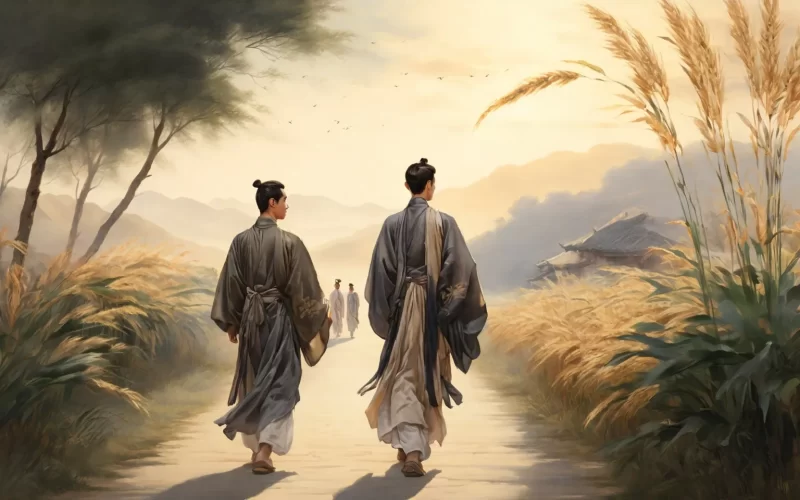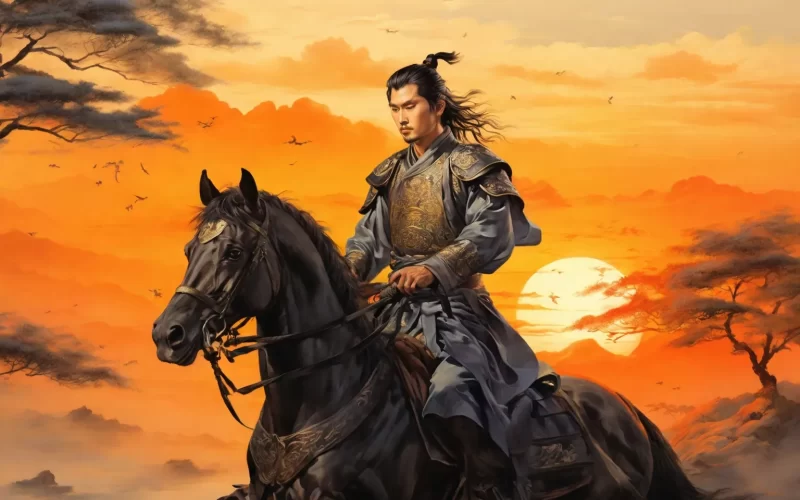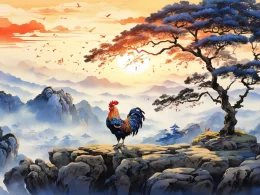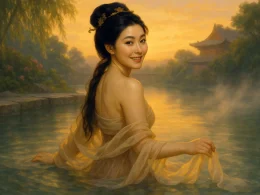In the Fourth-month the south wind blows plains of yellow barley,
Date-Rowers have not faded yet and lakka-leaves are long.
The green peak that we left at dawn we still can see at evening,
While our horses whinny on the road, eager to turn homeward .
…Ch'en, my friend, you have always been a great and good man,
With your dragon's moustache, tiger's eyebrows and your massive forehead.
In your bosom you have shelved away ten thousand volumes.
You have held your head high, never bowed it in the dust.
…After buying us wine and pledging us, here at the eastern gate,
And taking things as lightly as a wildgoose feather,
Flat you lie, tipsy, forgetting the white sun;
But now and then you open your eyes and gaze at a high lone cloud.
. The tide-head of the long river joins the darkening sky.
The ferryman beaches his boat. It has grown too late to sail.
And people on their way from Cheng cannot go home,
And people from Lo-yang sigh with disappointment.
…I have heard about the many friends around your woodland dwelling.
Yesterday you were dismissed. Are they your friends today?
Original Poem
「送陈章甫」
李颀
四月南风大麦黄,枣花未落桐叶长。
青山朝别暮还见,嘶马出门思旧乡。
陈侯立身何坦荡,虬须虎眉仍大颡。
腹中贮书一万卷,不肯低头在草莽。
东门酤酒饮我曹,心轻万事如鸿毛。
醉卧不知白日暮,有时空望孤云高。
长河浪头连天黑,津吏停舟渡不得。
郑国游人未及家,洛阳行子空叹息。
闻道故林相识多,罢客昨日今如何。
Interpretation
This farewell poem by Tang dynasty poet Li Qi employs unique conception and profound imagery to portray the noble character of his friend Chen Zhangfu, while simultaneously expressing the poet's own frustration at unrecognized talent. Blending admiration for his companion with lament over official disappointments, the work contemplates the reclusive life as an alternative to bureaucratic struggles.
First Couplet: "四月南风大麦黄,枣花未落桐叶长。"
Sì yuè nán fēng dà mài huáng, zǎo huā wèi luò tóng yè zhǎng.
April's southern winds gild the barley fields, While jujube blossoms cling and phoenix leaves wield.
The seasonal opening establishes the farewell context through agricultural imagery, using the barley's ripeness and enduring blossoms to symbolize both fulfillment and lingering attachment.
Second Couplet: "青山朝别暮还见,嘶马出门思旧乡。"
Qīng shān zhāo bié mù hái jiàn, sī mǎ chū mén sī jiù xiāng.
Blue mountains parted at dawn reappear at night, While my neighing steed evokes hometown's sight.
The constant mountains (青山) contrast with human transience, and the horse's neighing (嘶马) bridges physical departure with emotional nostalgia, creating spatial-temporal depth.
Third Couplet: "陈侯立身何坦荡,虬须虎眉仍大颡。"
Chén hóu lì shēn hé tǎn dàng, qiú xū hǔ méi réng dà sǎng.
How magnanimous Lord Chen stands, With dragon-whiskers, tiger-brows and broad forehead's brands.
The portrait of Chen with "dragon whiskers" (虬须) and "tiger brows" (虎眉) employs zoomorphic imagery to convey his heroic, unyielding character, with the broad forehead suggesting wisdom.
Fourth Couplet: "腹中贮书一万卷,不肯低头在草莽。"
Fù zhōng zhù shū yī wàn juǎn, bù kěn dī tóu zài cǎo mǎng.
Ten thousand scrolls stored in his mind, He won't bow to dwell among the blind.
The "ten thousand scrolls" (万卷) hyperbole emphasizes Chen's erudition, while "won't bow" (不肯低头) declares his refusal to compromise with mediocrity, establishing his intellectual integrity.
Fifth Couplet: "东门酤酒饮我曹,心轻万事如鸿毛。"
Dōng mén gū jiǔ yǐn wǒ cáo, xīn qīng wàn shì rú hóng máo.
At east gate he buys wine for our group, Treating worldly cares as goose down in soup.
The communal drinking ritual (酤酒饮我曹) demonstrates Chen's generosity, while the "goose down" (鸿毛) simile reflects his transcendental attitude toward mundane concerns.
Sixth Couplet: "醉卧不知白日暮,有时空望孤云高。"
Zuì wò bù zhī bái rì mù, yǒu shí kōng wàng gū yún gāo.
Drunk, we note not day's decline, But gaze at lone clouds' lofty line.
The drunken oblivion (醉卧) symbolizes temporary escape, while the "lone clouds" (孤云) represent both spiritual freedom and the isolation of unrecognized talent.
Seventh Couplet: "长河浪头连天黑,津吏停舟渡不得。"
Cháng hé làng tóu lián tiān hēi, jīn lì tíng zhōu dù bù dé.
Yellow River's waves merge with darkened sky, Ferrymen halt boats - no crossing nigh.
The raging river (长河) becomes a metaphor for bureaucratic obstacles, with the stopped ferry (停舟渡不得) symbolizing blocked career advancement.
Eighth Couplet: "郑国游人未及家,洛阳行子空叹息。"
Zhèng guó yóu rén wèi jí jiā, Luòyáng xíng zǐ kōng tàn xī.
Zheng's wanderer reaches no home, While Luoyang traveler sighs alone.
The parallel "wanderer" (游人) and "traveler" (行子) refer interchangeably to Chen and the poet, their mutual rootlessness emphasizing intellectual displacement in the bureaucratic system.
Ninth Couplet: "闻道故林相识多,罢客昨日今如何。"
Wén dào gù lín xiāng shí duō, bà kè zuó rì jīn rú hé.
I hear old groves host many resigned, How fare those who left posts behind?
The concluding rhetorical question (今如何) extends beyond Chen's situation to ponder the fate of all marginalized scholars, inviting reflection on the Tang intelligentsia's collective predicament.
Comprehensive Analysis
Transcending conventional farewell poetry, this work constructs a dialectic between public service and reclusion through three movements: the natural setting establishes temporal cycles; Chen's portrait embodies Confucian resilience; and the final river imagery confronts bureaucratic reality. The "lone clouds" and "old groves" become symbolic alternatives to frustrated official careers.
Artistic Innovations
- Intertextual Mirroring: The interchangeable "wanderer/traveler" trope merges the poet's and Chen's identities.
- Geomantic Symbolism: Mountains represent constancy versus the turbulent river of officialdom.
- Zoological Portraiture: Chen's dragon-tiger features reinvent the Confucian junzi through Daoist vitality.
- Metapoetic Closure: The ending question transforms personal farewell into generational inquiry.
Insights
The poem's enduring relevance lies in its treatment of intellectual displacement—a Tang dynasty precursor to modern discussions about educated unemployment. By juxtaposing Chen's "ten thousand scrolls" with the impassable river, Li Qi suggests that traditional learning may become its own obstacle in rigid systems. The "old groves" offer not just refuge but an alternative intellectual community, anticipating later scholar-hermit traditions.
Poem translator:
Kiang Kanghu
About the Poet
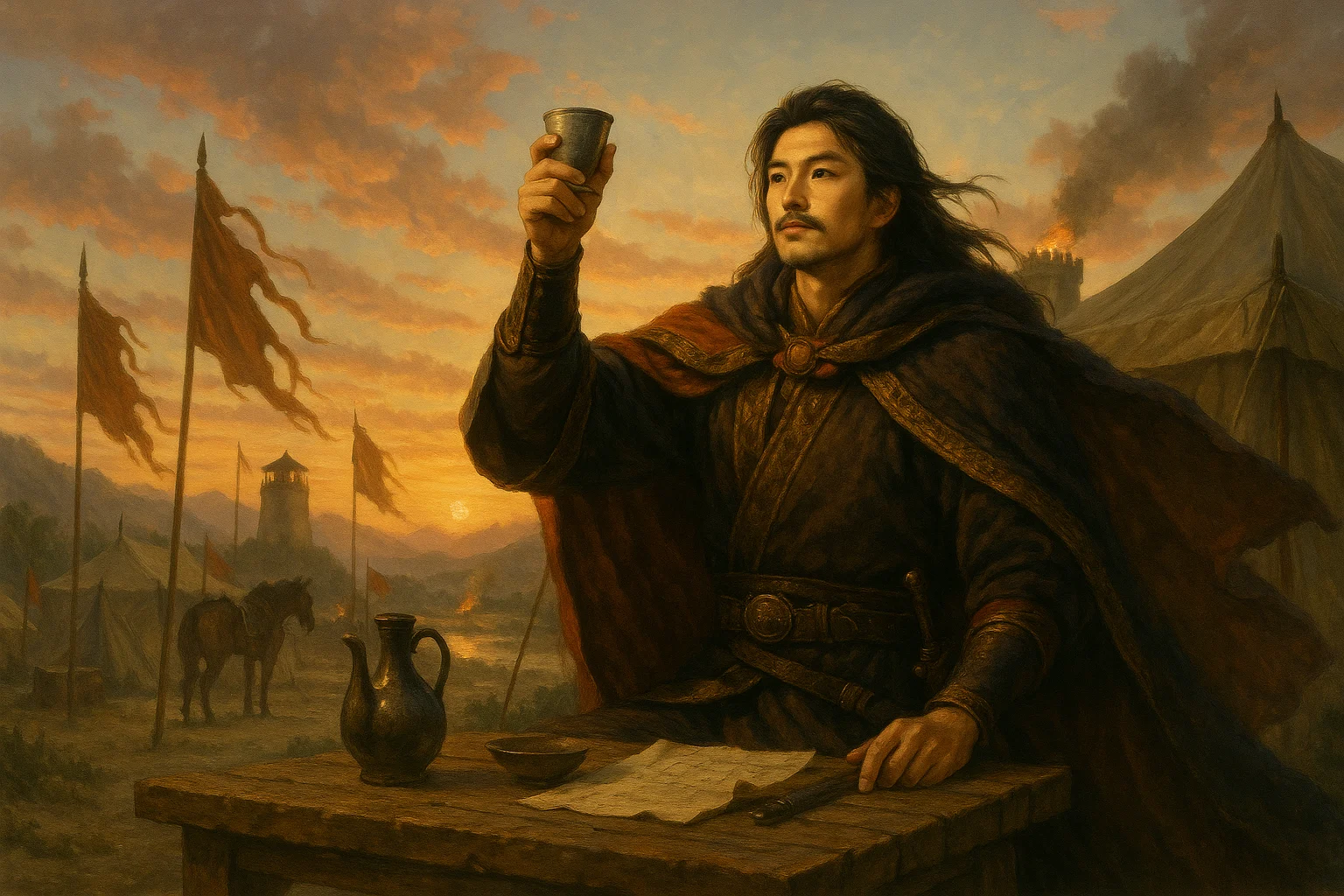
Li Qi (c. 690 - 753 AD) . A renowned Tang dynasty poet, Li Qi traced his ancestral roots to Zhao Commandery (present-day Zhao County, Hebei) but resided primarily in Yingyang (modern Dengfeng, Henan). Li Qi excelled in five- and seven-character verse forms, particularly frontier poems and musical poetry. He maintained close friendships with literary giants like Wang Wei, Gao Shi, and Wang Changling, later being grouped with them as one of the "Four Masters of High Tang" (Gao, Cen, Wang, and Li).






